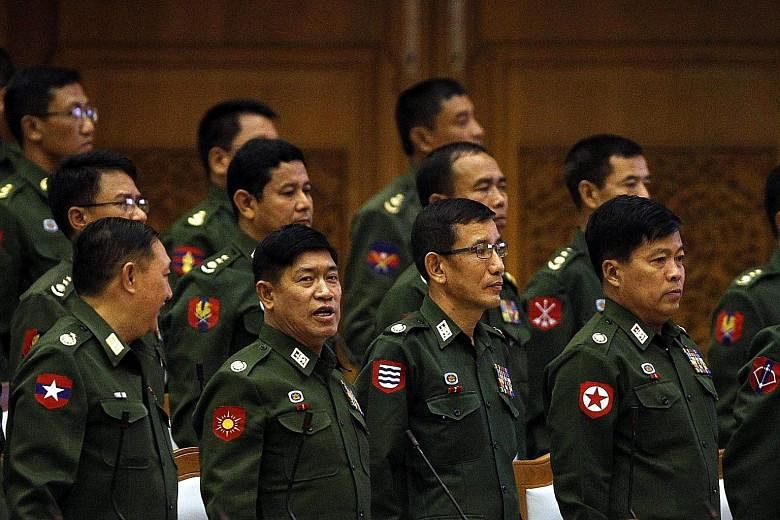At the crack of dawn tomorrow, with the statues of three ancient Burmese kings looking over them, Myanmar's armed forces will kick off their annual muscle-flexing Armed Forces Day parade.
The event near the capital Naypyitaw, complete with a fly-past as troops singing patriotic songs march in formation, will be a reminder of the military's role in the state. And its presence is unlikely to go away any time soon even as the country's first civilian president since 1962 prepares to take power on April 1, say analysts.
The military, or Tatmadaw, has climbed down significantly to allow Myanmar's latest experiment with democracy, but this will be a "firewalled" democracy.
Meanwhile, the army is still in conflict with ethnic armed forces in several areas.
Under the army-written Constitution, which bans National League for Democracy (NLD) leader Aung San Suu Kyi from the presidency because her late husband and two sons are British citizens, the army controls 25 per cent of parliamentary and state assembly seats.

And three members of the incoming 18-strong Cabinet - military men Sein Win, Kyaw Swe and Ye Aung - were handpicked by armed forces chief Min Aung Hlaing.
Lieutenant-General Sein Win will continue as defence minister; Lieutenant-General Kyaw Swe, former leader of the South-west Regional Command, will take charge of home affairs; and Lieutenant-General Ye Aung will oversee border affairs.
Earlier this month, as NLD Members of Parliament gathered in Naypyitaw to nominate Mr Htin Kyaw, a Suu Kyi loyalist, for president, Senior General Min Aung Hlaing was about 30km away, visiting the armed forces' museum near tomorrow's parade ground.
His speech - and the setting - left little doubt as to the self-image of the institution which, despite the change in Myanmar, still wields the most power in the country.
The museum covers an area the size of roughly 600 football fields, with fountains, soaring statues and buildings with long corridors. World War II aircraft, including a Spitfire, sit outdoors.
Big paintings of three generals dominate the entrance hall: Ms Suu Kyi's father Aung San, the late General Ne Win and Senior General Than Shwe.
In his speech, Senior General Min Aung Hlaing recalled how Myanmar lost its freedom to colonial forces in the 1800s. In a familiar refrain, he referred to "traitors who betrayed the country'' and to internal conflict after independence.
"One must understand that it was the army that had what was necessary to overcome the danger," he said.
Moving to the present, he said, the army supported the "changes and developments" under the current democratic system, but warned that it "will not accept any deviation from the current stable path".
"We have to work to make this country well respected and trusted by other countries in the world. We will have to persist in the right direction," he said.
"If we succeed, I believe that in 10, 15 years' time, there will be much more development than right now."
Mr Renaud Egreteau, a fellow at the Washington-based Wilson Centre and author of two books on Myanmar, said in an e-mail: "I don't see the current Tatmadaw leadership having moved beyond the ideology it first defined more than 60 years ago.''
He added: "The constant emphasis on the multiple threats to the Myanmar nation and its sovereignty that are posed by a vast array of internal and external threats has been, since the 1950s, a consistent mobilising discourse for the armed forces."
The message, said Mr Egreteau, is for not only the Burmese civilian elite, but also "the new generations of Tatmadaw officers (who) will lead the armed forces - and continue to intervene in political affairs - in the coming years, if not decades".
Historian Thant Myint-U recalled that in February 1949, a year after independence, Myanmar's army had control only of Yangon, while the rest of the country "was a sea of communist and ethnic insurgencies".
"For the armed forces, the history of the past 67 years is... of fighting from that incredibly fragile position to where they are now, in control of 90 per cent of Myanmar's territory," he wrote in an e-mail.
Their preoccupations have always been civil war and fears of foreign big-power interference, he said. "When the commander-in- chief says any rollback of the military's constitutionally entrenched power will not happen until the war is over, I think we have to believe him."


